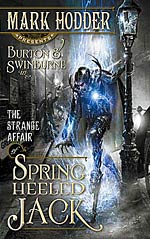
![]() jynnantonnyx
jynnantonnyx
1/19/2011
![]()
[There are spoilers throughout. This novel is difficult to review without referencing certain events in the story. In my defense, many of the later twists are strongly foreshadowed early on. Also, a special thanks to Pyr Books for providing WWEnd with a review copy of this book.]
Mark Hodder's inaugural novel neatly rides the popular wave of pseudo-Victorian Steampunk while mixing in well-worn science fiction tropes like time travel and genetic engineering. It's obvious Hodder has done his homework, as his depiction of the Victorian era is very detailed, both in its representation of the society as it actually was and in the minor and major changes that have taken place as a result of a time travel incident. It's like reading a Dickens novel with ray guns.
The novel's protagonist is Richard Burton, who in real history was something of a failed explorer (he made an early attempt to find the source of the Nile), a maligned statesman (tossed about from one consulship to another in later life) and a bit of a pervert (the least offensive thing he did was to be the first to translate the Kama Sutra into English). The main crux of the novel hinges on the fact that Burton's career makes a major turn to the better when he is hired to investigate the mysterious Spring Heeled Jack by special assignment of the Prime Minister. In this new timeline Burton feels that he barely escaped a horrible fate, validated during a collision with the aforementioned Jack, who tells Burton that nothing is as it ought to be.
Burton's partner, the story's secondary protagonist, is the minor poet Algernon Charles Swinburne. He's quite the opposite of Burton in many ways--short, thin, unathletic, somewhat effeminate--but he seeks the sort of life-threatening adventure that he feels is necessary to make his poetry great. That and the fact that he can easily disguise himself as a young chimney sweep gradually makes him an indispensable partner to Burton's investigation.
These two adventurers live in a world where Queen Victoria was assassinated on the same day Spring Heeled Jack was first spotted; a world in which the eugenics movement has progressed so far that super-intelligent dogs and birds act as message carriers; a world in which geothermal energy is tapped as a sustainable manner; a world in which cats act as living vacuum cleaners; a world where human brains can be transplanted into animal bodies and even into other human bodies to make double-brained beings; a world in which helicopter-like machines are common and genetic werewolves haunt the lower-class neighborhoods. This is the novel's biggest draw but also, I would argue, its major weakness, for it all hinges on the changes caused by one time traveler from the twenty-second century who effects all these changes simply by feverishly talking about the scientific wonders of the future to one man who happens to be well-connected. None of his own technology is reverse-engineered; apparently all that was needed to make all these changes happen in a few decades was to plant the ideas in a few minds. (The time travel logic itself is also very convoluted and self-contradictory. Badly written time travel always throws me out of the story while simultaneously giving me a headache.)
The plot revolves around a group of scientists attempting to perfect their social and genetic engineering plans. They want to create a perfect world, and they aren't afraid of murdering and causing widespread grief to bring this world about. This isn't the strongest aspect of the novel, which excels in describing its imaginative alternate England and the antics of its protagonists, but the worst that can be said of the plot is that it's just there to give our heroes something to do. One hopes that, now that the origin story is out of the way, the Burton and Swinburne team can proceed with their adventures without going through the motions of explaining why their world is the way it is. Honestly, the less time spent on that explanation the better, because it simply doesn't hold up to scrutiny.
Burton's major decision at the very end is amazingly cold-blooded and clearly defines his character as an anti-hero of ambiguous moral status. Even his fiancée Isabel is a clearly drawn character who could probably support a novel of her own. Swinburne is somewhat less defined since the novel follows Burton's point of view almost exclusively, but one hopes that future installments will spend more time with Swinburne and his poetic response to the strange world in which they live. Hodder's sequel The Curious Case of the Clockwork Man is due out this March, and this reader is definitely looking forward to seeing where he goes with the series.
http://blog.worldswithoutend.com/2011/01/the-strange-affair-of-spring-heeled-jack/